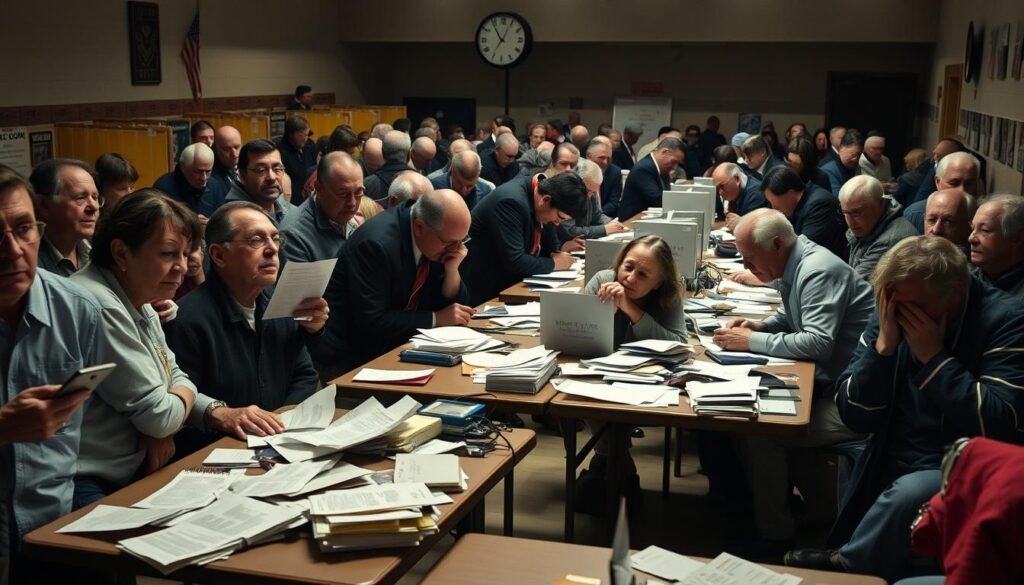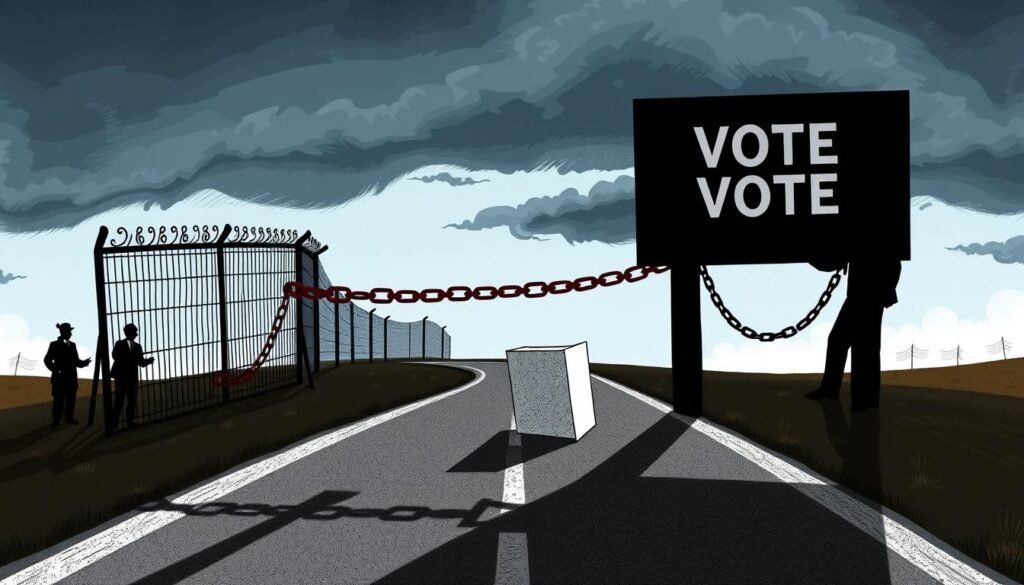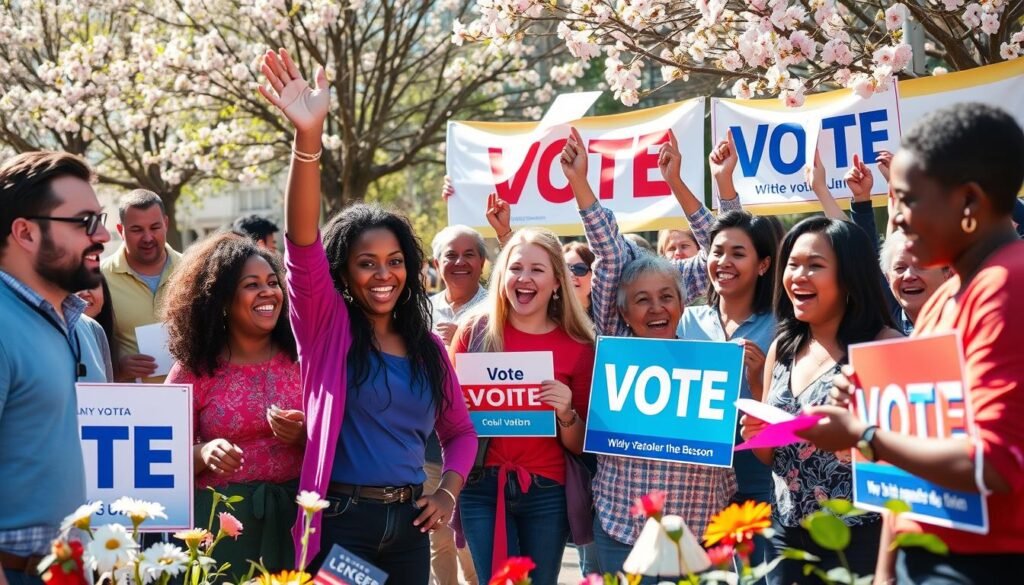Did you know countries with a lot of elections see fewer people voting over time? This drop in excitement to vote is called voter fatigue. In the U.S., where elections are always happening, it’s key to know what voter fatigue is and its effects. It helps keep our democracy strong.
Voters deal with many elections, facing issues like uncompetitive races and negative ads. This makes people less engaged. Looking closely at voter fatigue shows how it affects voting patterns. It also shows how it can harm society’s involvement in democracy.
Key Takeaways
- Voter fatigue leads to declining enthusiasm for elections.
- Frequent elections can significantly lower voter turnout.
- Lack of meaningful choices contributes to voter disillusionment.
- Negative campaigning exacerbates feelings of disengagement.
- Understanding voter fatigue is essential for improving civic engagement.
Introduction to Voter Fatigue
Voter fatigue is a big problem in today’s politics, especially in the United States. The election process can be too much, with non-stop requests for people to vote. This leads to feeling tired and less interested in voting.
It’s important to know how voter fatigue affects civic participation. Too many elections make people less likely to vote. The goal is to find a balance. We need active voting but without overwhelming everyone.
Talking about voter fatigue helps us see what stops people from voting. It also shows how it can hurt democracy. Making elections more interesting and easy to join is key. This way, people will want to vote and have a say in their future.
Voter Fatigue Definition
Voter fatigue is about feeling tired and disheartened during elections. It causes fewer people to vote. This fatigue comes from too many elections, endless political messages, and feeling like votes don’t count much. Getting the political disengagement idea helps us see why some folks tune out during elections.
Understanding the Concept
The electoral process can overwhelm voters, leading to political disengagement. A study shows 86% of 243 voters felt tired of politics at some point. The constant political noise and campaign overload wear people down. Studies show having frequent elections lowers voter turnout. It’s a vicious cycle where more campaigns mean less interest in voting.
How It Affects Voter Turnout
Voter fatigue results in fewer people voting. Complex ballots and unsatisfying candidate choices make it worse. Decision fatigue happens when voters face too many choices. This makes them too tired to vote again. Studies show that too many choices make voters unsure and lower turnout rates.
People not voting because they think it won’t change anything is a problem. This affects democracy, especially in places like Bulgaria or Israel. Despite different politics, voter fatigue is common there too.
Teaching voters how to handle election stress can reduce voter fatigue. Using resources like techniques for dealing with election fatigue can be very helpful.
Causes of Voter Fatigue
Understanding why voter fatigue happens is key to fixing falling election participation. Several reasons mix together, causing voters to pull back and feel disappointed. This makes a wide-ranging issue of people not wanting to take part in voting.
Frequent Elections
Elections happening often is a major cause of voter tiredness. In places with many elections a year, the pressure can be too much. This problem shows in countries with low voting numbers.
Being asked to vote too often can make people weary and lose interest. Eventually, they might not care about voting at all.
Lack of Meaningful Choices
Feeling like there are no real choices can push voters away. When all the options seem the same, people wonder if voting matters. This makes some think their vote won’t change anything.
Most of the time, few races really offer a choice. This leaves many voters feeling disheartened.
Political Disillusionment
Many lose interest in politics due to negative campaigning. Such tactics tire people out by focusing on what divides us. Not addressing real issues makes it tempting to just not participate.
Thus, people step back, thinking their vote won’t bring any real change. They see no point in getting involved.
Impact of Voter Fatigue on Elections
Voter fatigue is playing a big role in elections lately. A lot of people don’t vote because they see too much political stuff all the time. This makes them less interested in politics. Research shows that too much information and negative ads push voters away from participating.
Low Voter Turnout Factors
Many surveys show that fewer people are voting. For example, 62% of Americans feel tired of hearing about campaigns. This feeling can change election outcomes. It means the people who vote might not really represent everyone. In October, interest in the 2020 election was high at 75%. Yet, many were unhappy with their choices. They wanted different candidates. Having Biden and Trump as the main candidates in 2024 made many people less excited.
Effect on Democracy
Voter fatigue hurts democracy a lot. If fewer people vote, our leaders won’t truly show what everyone wants. This can make people feel left out. For democracy to work well, we need everyone to take part. But just 35% of Americans like to hear a lot about campaigns. Therefore, we should find ways to get more people to vote. Strategies like making voting easier and candidates talking clearer could help.

| Factors of Voter Fatigue | Impact on Voter Turnout | Effects on Democracy |
|---|---|---|
| Overwhelming Campaign Coverage | 62% report feeling worn out | Reduced engagement and representation |
| Negative Messaging | Contributes to civic disengagement | Polarization within political views |
| Lack of Meaningful Choices | Increases desire for alternatives | Disenfranchisement of various demographics |
| High Profile Candidates | Solidified public opinions | Limits diversity in political discourse |
We need to fight voter fatigue by making elections more interesting. Positive talk by candidates and teaching voters can boost voting. This will keep democracy strong.
The Role of Civic Engagement
Civic engagement is crucial in fighting voter fatigue, especially nowadays. Political ads and outreach calls are overwhelming many people. This makes civic engagement important as communities work to boost political involvement. Getting involved with local efforts can spark an interest in voting and democracy again.
Voter fatigue doesn’t just make people hesitant to vote. It impacts even those who normally take part and new voters, leading to lower turnout. As civic involvement drops, less people sign up to vote, showing a growing disinterest in politics.
A look at the numbers shows why we need better civic engagement. For example, 53% of U.S. adults who voted recently also got involved in political activities in the last six months. By educating citizens and involving them in community projects, we give them a role in democracy. This builds a sense of duty and belonging.
Improving civic engagement can take several forms:
- Launching projects that highlight voting’s importance.
- Running educational campaigns that teach about voting rights and procedures.
- Promoting social networks that encourage respectful political conversations.
These actions can lessen voter fatigue, enhance political involvement, and make citizens feel appreciated in their democracy.
Voter Apathy Causes
Voter apathy comes from many factors that stop people from voting. It’s key to know these causes to help make politics more engaging.
Barriers to Participation
There are many barriers to voting that keep people’s voices silent. Issues like few polling places and short voting hours are big hurdles. Problems with language and not enough information hurt too, especially for those already overlooked. These things lead to a sense of powerlessness which makes voter fatigue worse.
Influence of Negative Campaigning
Negative campaigning has a huge role in voter apathy. These campaigns often attack rivals instead of offering positive plans. This makes people distrustful and cynical about candidates and voting, causing them to stay away. Facing a hostile political scene, many decide not to join in the election process.

To boost civic participation, we need to overcome these obstacles. By encouraging inclusiveness and dependability, we can lessen the sting of negative campaigns. We can renew trust in politics. As people demand more openness from leaders, understanding these issues is vital for a more active voter base.
Election Burnout Trends
Election burnout trends reveal how elections impact our minds. A whopping 59% of Americans say they are tired of constant election news. This is a big jump from the 39% who find the news interesting. Among those not keen on election news, 69% feel burnt out. This is much higher than the 41% of avid news watchers who feel the same.
Too much media focus on candidates’ personal lives tires voters out. About 43% think this coverage is over the top. Additionally, 44% feel the media talks too much about what candidates say on the campaign trail. This often means that important policy discussions get overlooked, leaving 55% of Americans wanting more.
Age and race show unique trends in election fatigue. For young voters aged 18-29, 67% are overwhelmed by campaign news. In terms of race, 62% of White Americans feel more exhausted than their non-White peers, who are at 54%. Independents feel the most election burnout at 65%, more so than Republicans (54%) and Democrats (55%).
The political atmosphere adds to the stress. With the 2024 elections nearing, 74% of Americans are worried. They fear the outcomes might lead to violence. This anxiety may stop people from voting as it affects their overall life experiences.
Looking at these trends shows we need to tackle voter fatigue. Doing so can help make future elections more engaging and get more people excited about voting.
Strategies to Combat Voter Fatigue
To fight voter fatigue, we need active steps that boost engagement and participation. Improving how easy it is to vote and making sure there are strong candidates are key methods.
Improving Voting Accessibility
Making voting more accessible is crucial. By adding early voting, online options, and more polling places, we can make voting easier for everyone. Simplifying voting processes will lead to more people taking part. Also, offering help in many languages through resources like the 1-866-OUR-VOTE hotline can remove obstacles that lower voter turnout.
Increasing Candidate Viability
Having good choices in candidates is vital for voter engagement. Making elections more competitive by changing campaign finance and supporting new voices can help. Programs like Power the Polls, which get young people to work at polls, show how crucial community involvement is. As races get more exciting, people feel more connected to their choices.
| Strategy | Focus Area | Impact |
|---|---|---|
| Improving Voting Accessibility | Early Voting, Online Options | Increased Participation |
| Creating Viable Candidate Choices | Campaign Finance Reform | Competitive Elections |
| Community Engagement | Recruiting Young Poll Workers | Restorative Interest in Voting |
By using these strategies, voting systems can overcome voter fatigue. This will encourage a more active and interested group of voters.
Effects of Voter Indifference on Political Systems
Voter indifference deeply affects political systems. When many don’t vote, it leads to voter indifference consequences. This can mean elected officials don’t fully represent the people. As a result, policies might not meet the needs of citizens. This gap between people and politics grows apathy, making voters feel their choices don’t matter.
Looking at global voter turnout sheds light on the matter. For example, only 56% of Americans voted in 2016. This is low compared to countries like Belgium and Sweden, with turnouts of 89% and 86%. These differences hint at the complex factors behind political involvement.
The impact on governance is clear when officials elected by few make policies. These policies don’t always reflect what most people want. This can lead to public frustration and a lack of trust in politicians. A survey found that just 10% often feel hopeful about politics. Meanwhile, 80% think big donors have too much power over Congress.
To address voter indifference consequences, we need more civic involvement and changes in the system. Making people care and educating voters are key. We aim to end apathy and build a government that truly serves its people.
Compulsory Voting: Pros and Cons
Compulsory voting sparks debates about voter turnout. Supporters believe it boosts turnout and strengthens democracy. Countries with this system, like Australia, see high participation rates. There, voting turnout jumped from 67% to 91%. This shows compulsory voting benefits in beating voter fatigue.

Arguments for Compulsory Voting
Supporters say mandatory voting keeps people engaged. It makes sure governments reflect what people want and need. Enhancing voter turnout helps everyone, especially the less wealthy. Studies show turnout can be 12% to 30% higher with these laws. Even with light enforcement, turnout increases by 7.5 to 10%, showing it works well.
Criticism of the Concept
Yet, compulsory voting criticisms point out downsides, like personal freedom concerns. Critics believe forcing people to vote attacks their freedom of choice. They fear it leads to uninformed voting. People might vote without really understanding the issues.
The discussion gets tricky when comparing more voters to freedom choice. It’s crucial to weigh compulsory voting’s benefits against its effects on freedom and civic duty. For deeper insights, check this analysis here.
Conclusion
Voter fatigue is a big problem in the U.S. democracy. It’s caused by having too many choices and not enough information. Dr. Michael Munger found that this keeps people from voting, especially certain groups.
To fight voter fatigue, it’s important to get involved. Making ballots simpler and teaching voters can help. These steps aim to get more people participating in democracy.
Dealing with voter fatigue is key for better voter turnout and a stronger democracy. By focusing on civic involvement and tackling disenchantment, we can hope for a more active and fair political scene in the future.